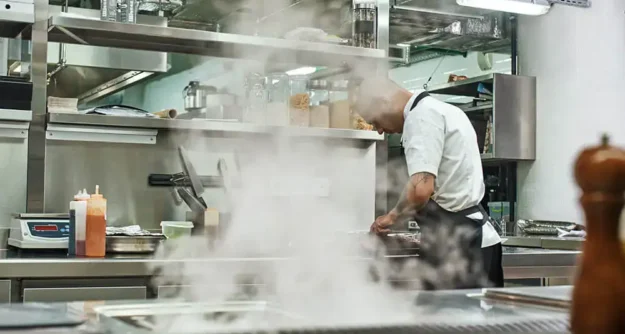Introduction
Baking may not seem like a very dangerous profession, yet workers are nevertheless exposed to a series of risks that can lead to short-term injury and/or long-term illnesses. From wet or uneven floors to dust inhalation, heavy weights, old equipment, as well as an unusually hot and noisy environment, the hazards in a bakery must be discussed with all employees in order to create a safe work space.
Potential Hazards
The risks most commonly associated with baking are:
Slips, Trips, and Falls.
Wet floors, as well as spilled batter, dough, and other dry ingredients increase the risk of accidental falls in a bakery. What’s more, employees are sometimes required to climb ladders and reach for supplies even though they are not properly trained to use the former. Same-level falls or falls from ladders can cause serious injuries, which is why workers should be made aware of the risks and cleanliness should always be maintained in the work place.Exposure to Asbestos and Flour Dust.
During the second half of the 20th century, asbestos was used in the construction of ovens, as well as in baking paper sheets designed to prevent the burning of food. Although the substance is now a known carcinogen and is no longer used for such purposes, many old bakeries that are still in use might continue expose workers to airborne asbestos fibers. Breathing flour dust may not be considered as dangerous, but repeated exposure can cause irritation of the eyes and respiratory system, as well as asthma.Lifting and Moving Heavy Objects.
Bakers must handle heavy ingredients – such as large bags of flour – as well as mixing bowls, food trays, and other vessels on a daily basis. If proper lifting techniques or equipment are not used, this can eventually put significant strain on workers’ backs and even lead to lower back and muscle injuries.Heat Stress and Burns.
Working in proximity of ovens, boiling water, hot ingredients, or hot oil may expose bakers to unusual levels of heat, which can lead to dizziness, exhaustion, confusion, and even heat stroke. In addition, a worker who is suffering from heat stress is more likely to make a mistake and accidentally injure themselves or a colleague. First-, second-, and third-degree burns are particularly concerning under the circumstances.
Incident Prevention
Although a series of preventive measures can be implemented to minimize risks, the effectiveness of these rules depends, to a great extent, on whether or not workers are properly trained to apply them. As is the case with most industries, rigorous safety training for all employees is the first step towards incident prevention.
Cleanliness is equally important in a bakery, not only because it can affect the quality of the food, but also because it can decrease the likelihood of accidents such as slips and falls. Furthermore, the inhalation of flour dust may be significantly reduced if the floors in a bakery are regularly cleaned using an efficient vacuum cleaner or a wet mop. Since repeated exposure to flour and dough may also sensitize the skin, the use of proper gloves and clothing is recommended.
Bakers must also be aware of the dangers of overexerting their bodies, especially when they lift, move, or carry heavy objects. Once employees are taught to assess the risk of lifting an object, as well as the symptoms of early heat stress, they can take immediate steps to prevent an accident.
Recommended Safety Courses



What You Can Do to Stay Safe
Across all jurisdictions in Canada, it is the legal responsibility of the employer to provide rigorous safety training for all workers. As a baker, your first step towards incident prevention should be to request such training and to apply the strategies you learn in safety classes during your daily work routines.
For a detailed list of safety courses that are most suitable for bakers, please consult our Agriculture and Food industry page.

